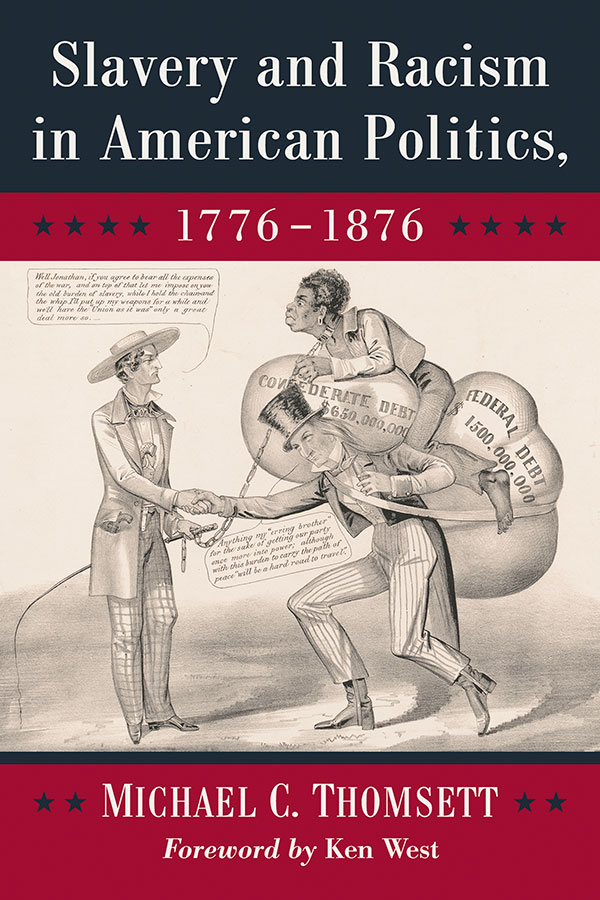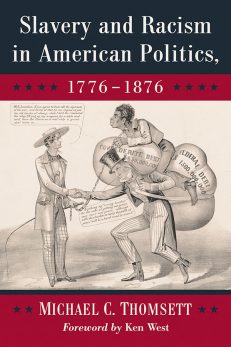Slavery and Racism in American Politics, 1776–1876
Original price was: $39.95.$19.99Current price is: $19.99.
In stock
About the Book
From the very inception of the United States, few issues have been so divisive and defining as American slavery. Even as the U.S. was founded on principles of liberty, independence and freedom, slavery advocates and sympathizers positioned themselves in every aspect of American influence. Over the centuries, the characterization of early American figures, legislation and party platforms has been debated.
The author seeks to clarify often unanswered–or ignored–questions about notable figures, sociopolitical movements and their positions on slavery. From early legislation like the Fugitive Slave Law of 1793 to Reconstruction and the rise of the Ku Klux Klan, this book explores some of America’s most controversial moments. Spanning the first American century, it offers a detailed chronology of slavery and racism in early U.S. politics and society.
About the Author(s)
Bibliographic Details
Michael C. Thomsett
Foreword by Ken West
Format: softcover (6 x 9)
Pages: 249
Bibliographic Info: 52 photos, notes, bibliography, index
Copyright Date: 2019
pISBN: 978-1-4766-7099-7
eISBN: 978-1-4766-3634-4
Imprint: McFarland
Table of Contents
Foreword by Ken West 1
Preface 3
Part I: Slavery, Political Parties and the Supreme Court
1. A Pill Too Bitter to Swallow 6
The Presentation of a Complex History 7 • Racism in Context 9
• Jim Crow 11
2. The Most Oppressive Dominion 15
Slavery in the New World 17 • The Three-Fifths Compromise 19 • The Slave Power 22 • The Northwest Ordinance of 1787 26 • The Fugitive Slave Law of 1793 27 • The Slave Trade Act of 1794 28 • Act Prohibiting Importation of Slaves of 1807 29 • The Missouri Compromise 29 • The Wilmot Proviso 31 • The Compromise of 1850 36 • Fugitive Slave Act of 1850 37 • Kansas–Nebraska Act of 1854 38 • The Ostend Manifesto 42
3. The Greatest Political Evil 44
The First Party System 45 • The Federalist Party 47 • The Emergence of the Whig Party 49 • The Free Soil Party 51 • Founders’ Concerns About a Party System 53 • The Era of Good Feelings 54 • Democracy and Andrew Jackson 55 • The Second Party System 56 • A Change in Political Climate 58 • Republicans from 1854 to 1860 59 • The Know Nothing Movement 62 • The Opposition Party and the Constitutional Union Party 64 • The Election of 1860 65
4. “A Slave, and Not a Citizen” 69
Slavery-Related Cases and the Supreme Court 71 • The Nullification Battle 72 • McCullough v. Maryland 73 • Gibbons v. Ogden 74 • The Antelope 75 • Roger B. Taney 76 • New York v. Miln 78 • The Amistad 79 • “Unless prohibited by state legislation” 82 • Strader v. Graham 84 • Dred Scott v. Sandford 85 • Ableman v. Booth 92 • Unintended Consequences 93 • Slavery and Racism in Context 94
Part II: Politics During the Civil War Years
5. Let Us Cross Over the River 98
The Secession Movement in South Carolina 100 • The Crittenden Compromise 101 • The Struggle Toward Secession 103 • Virginia’s Debate 105 • Lincoln’s Policies in 1861 107 • The Rise of the Copperheads 112 • Controversy About Secession and Slavery 116 • Suspension of Habeas Corpus 118 • Copperhead Editorials on Slavery 120
6. The Age of the Copperheads, 1862–1863 122
The Evolution of a Struggle: 1862 123 • Copperhead Racism in the North 125 • Lincoln’s Decision: The Emancipation Proclamation 127 • Copperhead Reaction 131 • The Copperhead Response 135 • The Intellectual Arm of the Copperheads 136 • Pro-Lincoln Responses 138 • The Enrollment Act 139 • Growing Copperhead Strength 143 • A Change in Sentiment 145
7. Copperhead Resistance, 1864–1865 148
Possible Replacement Candidates for Lincoln 148 • Southern Economic Problems in 1864 151 • The Party Platforms 154 • Conspiracy in 1864 by Copperhead Groups 158 • Confederate Efforts at Negotiating Peace 162 • The Political Climate in 1864 163 • Political Responses to Lincoln’s Victory 165 • Post-Election Conditions and the Thirteenth Amendment 166
Part III: Politics During Reconstruction
8. Parties in Conflict—The Johnson Administration 172
Andrew Johnson and the Post-War Era 173 • The New Administration and the South 174 • The Freedmen’s Bureau Bill 175 • Black Codes in 1865 and 1866 178 • The Civil Rights Act of 1866 180 • Johnson’s Loyalty to the Democrats 182 • Concerns Among Democrats 185 • The Election of 1868 187
9. Presidents Grant and Hayes and the Ku Klux Klan 190
President Grant’s Election 192 • Origins of Secret Societies in the U.S. 195 • The Klan’s Purpose Evolves 198 • The Klan
As an Underground Terrorist Organization 200 • Grant’s Second Administration 203
Chapter Notes 209
Bibliography 223
Index 235
Book Reviews & Awards
“No serious student of American history can deny the importance of this book’s focus—slavery and white racism as a leitmotif during the first 100 years of US history. Positioning southern slavery at the core of this history, the author surveys how the ‘peculiar institution’ began, evolved, and concluded during the crucible of the Civil War, but reemerged in a different guise during Reconstruction. … factually driven…extremely well-illustrated…recommended”—Choice





